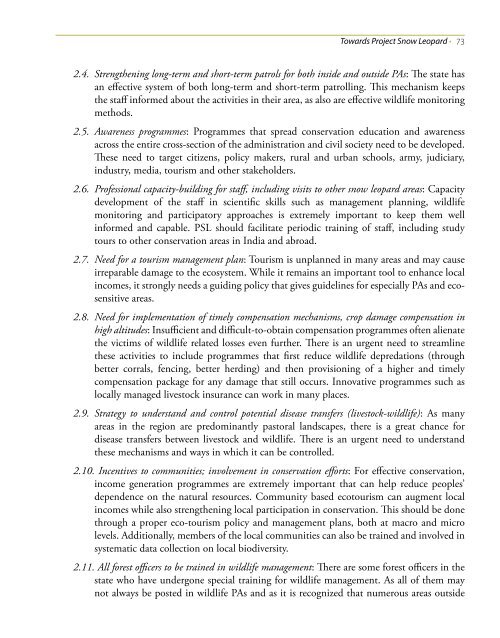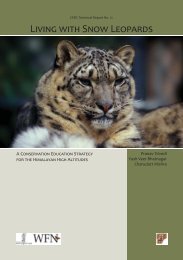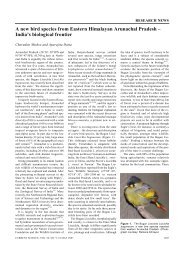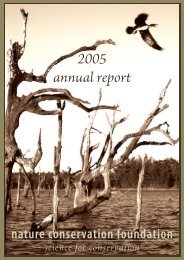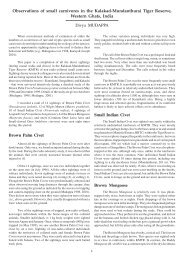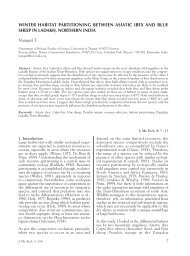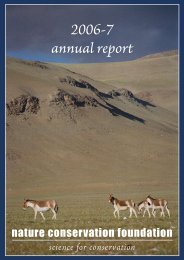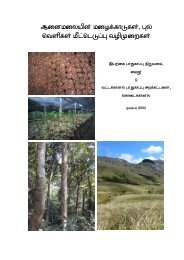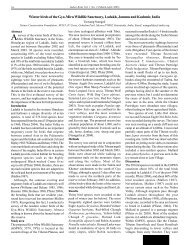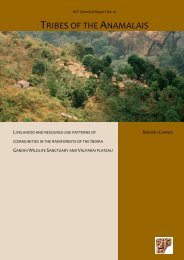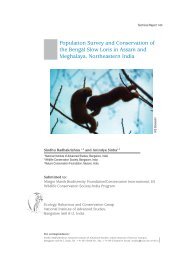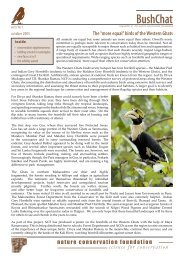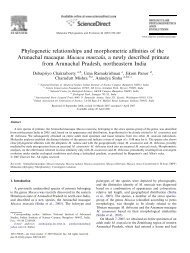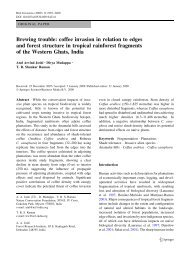towards project snow leopard - Nature Conservation Foundation
towards project snow leopard - Nature Conservation Foundation
towards project snow leopard - Nature Conservation Foundation
You also want an ePaper? Increase the reach of your titles
YUMPU automatically turns print PDFs into web optimized ePapers that Google loves.
Towards Project Snow Leopard • 73<br />
2.4. Strengthening long-term and short-term patrols for both inside and outside PAs: The state has<br />
an effective system of both long-term and short-term patrolling. This mechanism keeps<br />
the staff informed about the activities in their area, as also are effective wildlife monitoring<br />
methods.<br />
2.5. Awareness programmes: Programmes that spread conservation education and awareness<br />
across the entire cross-section of the administration and civil society need to be developed.<br />
These need to target citizens, policy makers, rural and urban schools, army, judiciary,<br />
industry, media, tourism and other stakeholders.<br />
2.6. Professional capacity-building for staff, including visits to other <strong>snow</strong> <strong>leopard</strong> areas: Capacity<br />
development of the staff in scientific skills such as management planning, wildlife<br />
monitoring and participatory approaches is extremely important to keep them well<br />
informed and capable. PSL should facilitate periodic training of staff, including study<br />
tours to other conservation areas in India and abroad.<br />
2.7. Need for a tourism management plan: Tourism is unplanned in many areas and may cause<br />
irreparable damage to the ecosystem. While it remains an important tool to enhance local<br />
incomes, it strongly needs a guiding policy that gives guidelines for especially PAs and ecosensitive<br />
areas.<br />
2.8. Need for implementation of timely compensation mechanisms, crop damage compensation in<br />
high altitudes: Insufficient and difficult-to-obtain compensation programmes often alienate<br />
the victims of wildlife related losses even further. There is an urgent need to streamline<br />
these activities to include programmes that first reduce wildlife depredations (through<br />
better corrals, fencing, better herding) and then provisioning of a higher and timely<br />
compensation package for any damage that still occurs. Innovative programmes such as<br />
locally managed livestock insurance can work in many places.<br />
2.9. Strategy to understand and control potential disease transfers (livestock-wildlife): As many<br />
areas in the region are predominantly pastoral landscapes, there is a great chance for<br />
disease transfers between livestock and wildlife. There is an urgent need to understand<br />
these mechanisms and ways in which it can be controlled.<br />
2.10. Incentives to communities; involvement in conservation efforts: For effective conservation,<br />
income generation programmes are extremely important that can help reduce peoples’<br />
dependence on the natural resources. Community based ecotourism can augment local<br />
incomes while also strengthening local participation in conservation. This should be done<br />
through a proper eco-tourism policy and management plans, both at macro and micro<br />
levels. Additionally, members of the local communities can also be trained and involved in<br />
systematic data collection on local biodiversity.<br />
2.11. All forest officers to be trained in wildlife management: There are some forest officers in the<br />
state who have undergone special training for wildlife management. As all of them may<br />
not always be posted in wildlife PAs and as it is recognized that numerous areas outside


